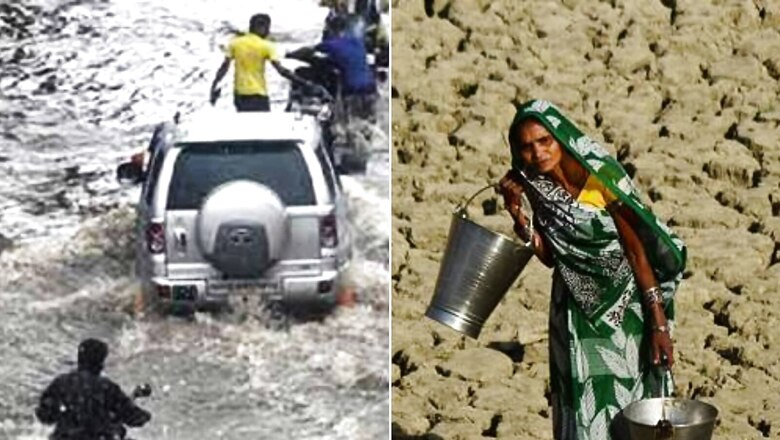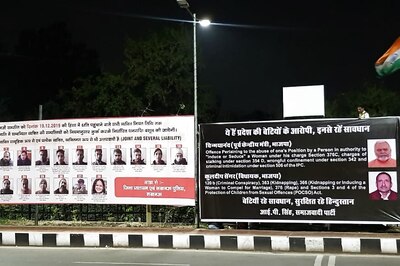
views
Last month, temperature levels crossed 40 degrees in Great Britain. This was accompanied with droughts preceded by massive forest fires across France, Greece, Spain, Greece and Portugal. In response to this, the UK’s Met Office declared a National Emergency in the country.
Every year, summers have been arriving earlier and sustaining longer. Climate catastrophic events are being experienced by everyone. The visible impacts of climate change induced by anthropogenic activities have never been this direct before. Time to think and blame each other is long over. Now is when we act and mitigate the risk factors. As the world plans to cut down our carbon emissions to net zero by 2050, the need is to reduce the impacts for people for whom they are a daily reality.
Heat waves in and around India
This year saw troubling heat waves in and around India. Several cities in the country were swept by disastrous heat waves. The year 2022 recorded 280 heatwave days between March and May — the highest in the last 12 years, as per the Centre for Science and Environment report released earlier this month. Pakistan too saw extreme heat waves. Jacobabad, in Pakistan, was named the hottest city on the planet two months back and the people there are living on the searing edge of climate change. Apart from this, southern and eastern parts of China have seen unprecedented high temperatures in recent weeks
Rise in temperature faster than predicted
According to our estimations, the weather events occurring today were expected a decade or so later. Climate scientists are worried about the warp up speed of the events and their impacts. The frequent events are unprecedented. With the continuing rise in temperature, it will be impossible to limit global temperature rise to 1.5 degrees or even 2 degrees.
Backing out from Shared responsibility
It is only in recent times that the global north has started to see such direct and massive impacts of climate change. Several studies show that the global south has been in jeopardy as a result of the actions by the developed world. Reduced accountability on the part of certain nations is undoubtedly burdening others.
Effects of Climate Change
Almost the entire globe has been seeing an increase in hotter days and heat waves. The frequency and intensity of extreme weather events such as floods, cyclones and droughts have also increased in the past decade. They have not only claimed lives but also destroyed homes and resulted in massive income losses, more migrations and adverse health outcomes. The changes in weather patterns are also leading to a disturbance and decrease in food production, increasing food scarcity for the vulnerable.
What can India do?
Although India has not been a major contributor to the overall global emissions, we still have to make huge cuts in our carbon emissions. Before we do that, it is important that we pressure the developed countries to reduce their emissions and do their part. Rich countries were able to climb up the development ladder because they were able to industrialise quickly and help their population come out of poverty. In this process, they released most of the global emissions.
In the COP26 meet, India has made promises to make significant cuts in its emissions but the country has a long way to go. One of the most important things is a shift to cleaner fuels. Three-fourth of the existing capacity is derived from highly polluting coal, oil and biomass. A shift to renewables means not only replacing existing capacity but also adding new renewable energy capacity. As compared to other countries, India’s per capita power consumption is quite low. For instance, the US’ consumption is 10 times more than India’s lowly 12,000 kWH per capita per year. This is bound to increase as we develop.
Introduction of an in-country carbon credits system is also recommended. For the system to work, caps would have to be placed on carbon emission per institution. This system will allow excess emitters to buy carbon allowances from the ones who have carbon allowance left. It will encourage industries to decrease their carbon emissions.
An eventual compulsory rating of products and services based on their impact on the environment is a good way forward. It should cover everything from homes and cars to delivery services. This green rating is similar to BEE star labels for electrical appliances and will let the users know how friendly the product or services they are using are. Hence, enabling them to make more informed decisions.
Climate education is also pertinent. Educating the next generation about climate change will help them be better prepared for that. If people are taught from an early age about the importance of these measures, they will not resist in making undesirable but important changes that have to be made if we have to prevent disastrous damage from climate change. We will also need to add to curriculum “green skills”. These are skills that make people more ready for climate-friendly jobs such as training in renewable energy and skills in mitigation from extreme weather events.
Developed countries, which have become prosperous while taking advantage of no caps on carbon emissions, have a responsibility to help countries such as India develop in a more climate-friendly way. This involves not only help with carbon credits, technology transfer and finances, but also a commitment to do more under the common but differentiated responsibilities approach.
Mahek Nankani is Assistant Programme Manager, The Takshashila Institution. Harshit Kukreja is Research Analyst, The Takshashila Institution. The views expressed in this article are those of the authors and do not represent the stand of this publication.
Read all the Latest Opinion News and Breaking News here




















Comments
0 comment